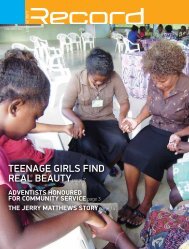AMBASSADORS VISIT cAMBODIA page 8 - RECORD.net.au
AMBASSADORS VISIT cAMBODIA page 8 - RECORD.net.au
AMBASSADORS VISIT cAMBODIA page 8 - RECORD.net.au
You also want an ePaper? Increase the reach of your titles
YUMPU automatically turns print PDFs into web optimized ePapers that Google loves.
HEALTH FEATURE<br />
with Cathy McDonald<br />
Just add water<br />
Do you often feel irritable or have regular headaches?<br />
We often blame the demands of a busy life; however it<br />
may be that we simply need to drink more water.<br />
Water is essential for life—without it we would survive<br />
only a few days. Water is responsible for transporting<br />
nutrients in our bodies, temperature regulation and the<br />
removal of waste from our bladder. Our body is made up<br />
of 60-70 per cent water; in children this can be as high as<br />
80 per cent.<br />
Daily we lose water through urine, stools, sweat, tears<br />
and as water vapour as we breathe. We replenish this<br />
from the fluids we drink and foods we eat. A small amount<br />
of water is also produced as a by-product of metabolism.<br />
Dehydration occurs when the amount of water leaving<br />
the body is greater than the amount being consumed. To<br />
maintain hydration we need to drink eight glasses a day.<br />
However this can vary according to individual requirements.<br />
The initial signs of dehydration begin when we<br />
have lost about 2 per cent of total body fluid. These include,<br />
but are not limited to, thirst, fatigue, irritability and<br />
headaches.<br />
Serious illness can develop if fluid loss continues up to<br />
5 per cent of total body fluid and if the body reaches 10<br />
per cent total body fluid loss, emergency medical help is<br />
needed. Fluid loss 10 per cent and above can be fatal!<br />
Don’t rely on feeling thirsty to remind you to drink, as<br />
by this time we are usually already dehydrated. Ensure you<br />
drink sufficient quantities to maintain pale coloured urine<br />
throughout the day.<br />
Who is at most risk of dehydration?<br />
Kids—due to their small body weight and high water<br />
content they are more susceptible to dehydration. They<br />
often cannot vocalise that they are thirsty and are more<br />
susceptible to illnesses which can result in dehydration.<br />
Try ice blocks and jelly to increase fluid intakes in unwell<br />
children. Often a drink bottle on their desk in class will<br />
help remind them to drink. Carry water bottles in the car,<br />
particularly over summer.<br />
The elderly—their sensitivity to thirst becomes less acute,<br />
they are slower to respond to changes in environmental<br />
temperature and tend to eat and drink less. They may also<br />
be on medication, have hormone changes or an illness<br />
that may c<strong>au</strong>se dehydration. Make drinking convenient—<br />
have a sipper bottle on hand or add a slice of lemon or<br />
lime to flavour water.<br />
Those with an illness such as fever, vomiting and diarrhoea—water<br />
and electrolytes such as sodium and potassium<br />
are essential to maintain fluid levels. If you or your<br />
family are suffering from gastric illness it is advisable to<br />
discuss fluid and electrolyte replenishment with your doctor.<br />
Athletes and those working in a hot humid environment<br />
–increased sweating requires increased fluid intake.<br />
Consider using a sports drink when training for intervals<br />
longer than one hour, to replenish both fluid and electrolyte<br />
levels.<br />
People with uncontrolled diabetes or those on medications<br />
that have a diuretic effect.<br />
If you would like to speak with one of our nutritionists, call 1800 673 392 (Aus) or 0800 100 257 (NZ). Alternatively, email<br />
us with a nutrition question at (Aus) or (NZ). And don’t<br />
forget to order your FREE copy of Food for Health and Happiness Cookbook—it has plenty of delicious and wholesome<br />
recipes. To order the cookbook, visit our website or .<br />
RECIPE<br />
Vanilla, berry and ginger smoothie<br />
n 2 cups Sanitarium So Good Vanilla soy milk<br />
n 4 pear halves<br />
n 1 cup frozen raspberries<br />
n 1 tablespoon honey<br />
n 1cm ginger, peeled and sliced<br />
n 150g pottle berry yoghurt<br />
1. Place all ingredients in a blender and blend until smooth. Serve.<br />
Serves 2.<br />
Preparation time: 5 minutes.<br />
PER SERVE: 1400kJ (335 calories); Protein 12; Fat 11g;<br />
Carbohydrates 48g; Sodium 133mg; Potassium 775mg; Calcium<br />
424mg; Iron 2.5mg; Fibre 5g.<br />
record.<strong>net</strong>.<strong>au</strong> • JANUARY 21, 2012 13

















